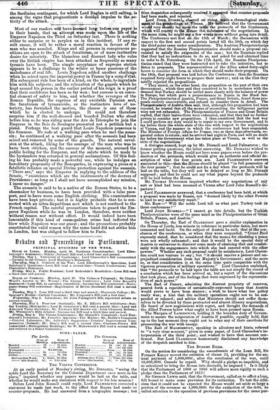Most of our readers will have learned long before our
paper is in their hands that aa attempt was matle upon the life of the Emperor Napoleon the Third on Saturday last. There is nothing either to surprise or to perplex us in this incident. If any re- sult ensue, it will be rather a moral reaction in favour of the man who was assailed. Kings and all persons in conspicuous po- sitions are open to the attack of fanaticism or of mere instinctive desire for notoriety. The blameless and discreet lady who rules over the British empire has been attacked as frequently as many tyrants have been. The simple acceptance of supreme station appears to be a challenge to the wilder or baser passions of the melodrama of real life. Louis Napoleon added another challenge when he seized upon the imperial power in France by a coup d'etat. His subsequent rule has been of a kind, on the whole, to ingratiate him with his subjects ; and the relaxation of the guards which he kept around his person in the earlier period of his reign is a proof that their confidence has been so far won : but success is an essen- tial element of safety to him, and whether the revenges of the Roman Republic, the caprices of any excitable Parisian sect, the fanaticism of tyrannicide, or the instinctive love of no- toriety, has furnished the motive, the chance is one of those which he is elected to undergo. It could not therefore surprise him if the well-dressed and bearded Italian who stood before him as he was ridinr,6 near the Are de Triomphe to join the Empress in the Bois de 11oulogne presented not a petition but a pistol. Perhaps the best guard that Louis Napoleon possesses is his firmness. He rode at a walking pace when he met the assas- sin; he continued at a walking pace after the assassin bad been seized and removed by some of the guards. The natural revul- sion at the attack, liking for the courage of the man who was to have been stricken, and the success of the moment, aroused the public feeling for the Emperor, and the salute which he made to the bystanders was returned in general acclamations. Of this feel- ing he has probably made a powerful use, while be indulges an hereditary propensity of the Bonapartes, in expressing a pious or a fatalistic reliance on special Divine protection against the assassin. "There are," says the Emperor in replying to the address of the Senate, "existences which are the instruments of the decrees of Providence: so long as I shall not have accomplished my mission, I incur no danger.'
The assassin is said to be a native of the Roman States, to be a shoemaker by business, to have been provided with a false pass- port, and to have worn some English clothing. His examinations have been kept private ; but it is highly probable that he is con- nected with an ultra-Republican sect which is not confined to the French capital. The careful precautions taken to guard the Em- peror Napoleon while he was in London, therefore, were neither without reason nor without effect. It would indeed have been lamentable if this kind of cosmopolitan crime had inflicted the blow while Napoleon was our guest ; and the precautions probably constituted the valid reason why the same hand did not strike him in London, but was obliged to follow him to Paris.


































 Previous page
Previous page